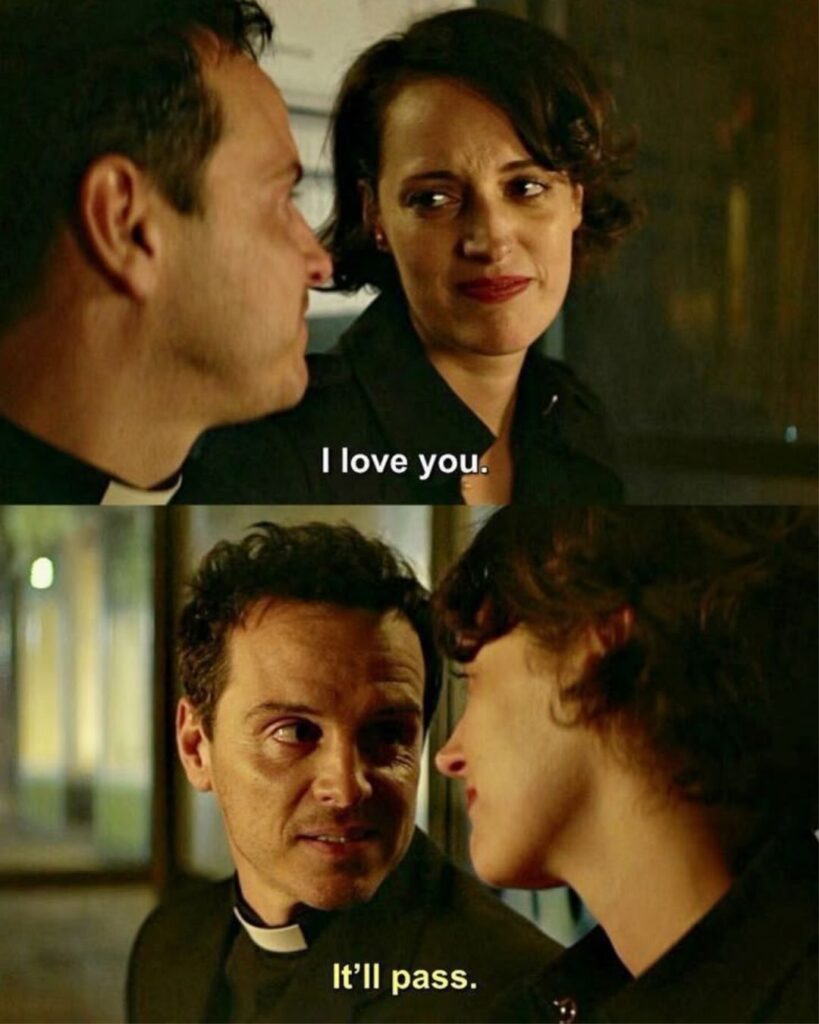If She Has A Fleabag Poster In Her Room, RUN.
As much as we try to disconnect from the digital world, most of our lives are deeply intertwined with the algorithmic language. We live for social media – not for the sake of living.
Personalities are derived and curated for social media – you are either just a chill guy or a chronically online stalker who knows your best friends’ ex’s whereabouts. There’s no in between. We are becoming characters that are relatable to the larger masses . You must’ve seen fleabag at least once on your feed. Whether her miserable self crying and mascara dramatically rolling down her cheeks, or a hot priest rejecting her in the most brutally honest way possible.

But who is fleabag anyway?
Fleabag is often associated with emotionally complex, self-aware, and sometimes self-destructive individuals, especially women who resonate with the show’s themes of trauma, guilt, and messy relationships.
A six-episode long mini-series/TV show, written and directed by the actor herself, Phoebe Waller-Bridge explores the life of a 26 something year old single woman living in London. A failed love life, no aspirations in life and a lifelong guilt of abetment to suicide of her best friend drives the personality and therefore the plot of fleabag. She isn’t just a character, but a culmination of all the flaws and red flags found in women in their mid 20’s trying to find the meaning of life.
Fleabag, in short, REPRESENTS these women and everything that is to be fixed in them. Be it their love life, sexual awakening, impulsive decisions, failed startups, disloyal friendships, dysfunctional family relationships, and everything in between.
Due to the unfortunate public discourse over the internet labels your interests towards certain personality traits, namely, ‘red flags’.
If you like fleabag, you might be:
Too introspective:
You read between the lines and overthink, A LOT. you analyse the minutest detail of your life, izt may or may not be related to you. You repeat every single conversation with your crush and go over every possibility of how that would’ve turned out to be.
A sucker for trauma:
You thrive on emotional turmoil. You want that drama in your life, you want to spill that tea to irrelevant people, trauma dump on your one night stands and so much more. You’re probably the one who shouts ‘fight!fight!fight!’ while sitting at the back sipping your iced mocha chai tea frappe hazelnut latte Ariana grande. You instigate fights with your friends because you were ‘bored’.
Are not too well-versed in relationships:
You need a crash course on empathy, oversharing, and strong dating advice from a friend who’s been single since birth. You do not understand how two-way relations work – both romantic and platonic. You’re either too giving or very distant and closed – there’s always something holding you back.


Are emotionally unavailable:
You feel deeply but sometimes struggle to communicate it. You bottle up your feelings and then your volcano bursts at the worst possible time, probably a family gathering, and you then do not know how to control your emotions. You start crying. Uncontrollably. That’s how you get those dramatic mascara tears cheek tattoo.
Here’s the thing: Fleabag is everything we don’t want to be.
She isn’t the endgame – she is the exact opposite of that. Fleabag is not an aspiration. But a gentle reminder, to pick yourself up, and dust yourself off, and work on yourself to become the version of her when she meets the hot priest. Where she finally accepts a heartbreaking closure, and yet moves on with life with the same jolly simple attitude we saw in S1E1.
Of course, this is just a stereotype. Loving Fleabag probably just means you appreciate sharp writing, complex characters, and breaking the fourth wall. But in the age of meme-based psychoanalysis, anything can be a “red flag” if you squint hard enough.
Thanks for reading, fr! Share if you like it enough. Follow us on Instagram & LinkedIn for more.


